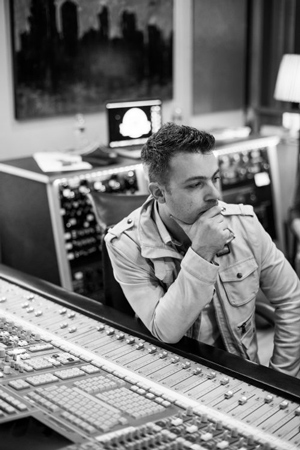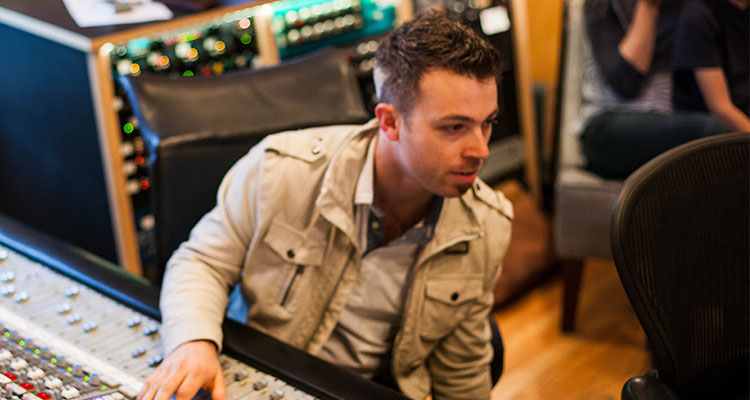In the past few issues of CCM Magazine (see May 1 and May 15, 2016 editions under the “MAGAZINE” heading on CCMmagazine.com), we have featured excerpts from Seth Mosley’s Full Circle Music Show podcast, an ever-increasingly popular program among music fans, those working in or aspiring to work in the music business, and simply just forward-thinking individuals searching for an inspiring word. Week after week, Mosley invites a who’s who of industry veterans to join him in fruitful discussion about various aspects of the music industry, but it’s the last group of fans mentioned above that has us interested in turning the tables and placing him in the hot seat.
So, we ask Mosley a set of questions anyone would want to inquire of an award-winning producer and songwriter. Whether your aims are to be an artist, executive, band leader—or an architect, athlete, pastor—Mosley’s ongoing message of servitude and “being second” rings true for all of us.

photo: Celi Mosley
CCM Magazine: You have written with many established songwriters—as you began to gain experience, what led to a sense that your writing was worthy of collaborating with more established writers? And thinking back, any advice on new songwriters and the types of co-writing opportunities they need to pursue (or NOT pursue) to become established in their own right?
Seth Mosley: This is always my number one advice to anyone wanting to be more successful in songwriting or anything in life: Don’t be the smartest person in the room. If you are, then it’s probably time to find a new room. I’ve always tried to surround myself with people who are better than me in every aspect. There are certain strengths I have, sure, but I’m never going to grow if I’m never challenged.
The key to this is the ability to overcome fear and insecurity. It can be a scary thing to go into a room with someone who you’ve been a fan of for your whole life. I’ve been there multiple times. My company is named Full Circle Music because my first record I ever got as a kid was Newsboys, and the first one I produced in Nashville was Newsboys. Talk about a trip. My first vocal session with [Michael] Tait I was so nervous, because, why should he listen to me when I say “Do that take again,” or, “I know you can sing that line better.” It helps to remember this one key fact—even the best of the pros are all insecure too. No one is ever exempt from this fact, no matter how successful you are.
In a way, by doing this, and surrounding yourself with people more experienced and smarter than you, every situation becomes a mentorship for you.
CCM: We’ve often heard that a great producer has to have an “ear” for music—take that somewhat obvious, overused, and vague statement, and provide for us some practical dialogue on both what types of artists and at what talent levels producers like yourself are eagerly looking to work with. Also, how and/or when is it appropriate to speak into what an artist is wanting to record, for both of your sakes?
SM: For the first part of the question, I totally agree. It is all about having an “ear” for music. And even more than just an ear for music, it is having an ear to hear what people are saying. This may seem obvious, but the best producers and songwriters are the ones who just simply listen and ask the right questions to the artist. We are very much servants to the artist and how can we serve them if we don’t know where their hearts are? We certainly aren’t going to write or produce music that resonates with where they are and is authentic to them, if we don’t become good listeners. That is precisely why I never think that just sitting in a co-writing room talking for the first hour or two is a waste of time. In fact, it’s the opposite.
For the second part, there are two types of music producers: Ones who impart their thing on a project, and the other who brings out the best version of an artist and conveys it to a record. Our goal 100% is the second. The worst thing I could ever hear is, “That feels like a Seth Mosley record,” or, “Those records sound like Full Circle Music.” I really love working with artists who have a strong creative center in themselves. Audiences are really only looking for one thing nowadays—AUTHENTICITY. I don’t personally believe it’s authentic to have a producer spoon-feed a “sound-du-jour” to the artist and then they go play it live. I think it certainly can work that way, but the artists who stick around, are the ones who know who they are and what they have to say. This doesn’t mean every artist has to write 100% of their songs on their own, or produce all their own stuff. They really do need us as co-creators. But it does mean that they have to have a strong creative drive in and of themselves.
CCM: In your opinion, what’s the current climate for up and coming music/artists these days? Are you finding it to be a talent-rich environment with the potential for some budding mega-stars—or are you experiencing more of a follow-the-leader right now? If the latter, how could you encourage the young music community to grow?
SM: I want to go back to my first response and re-iterate the importance of not living your life out of fear. If you’re living a life out of fear of, “Will this work?,” or, “What will other people think?,” that’s the greatest strategy to never stand out. Here’s the thing that always helps me: I just know that what I do isn’t for everybody. Try to please everyone and you please no one.
I think it is an incredibly talent-rich environment, and the opportunity is limitless for artists and writers who never had platforms like YouTube and social media to get their music out FOR FREE. There are no longer any gatekeepers between the fans and the creators. It’s really mostly about who has the most passion, drive, and stick-to-itiveness. Even the process of making records has changed and needs to change.

photo: Celi Mosley
My encouragement is to listen to your fans. Here’s a story that might help clarify this point. I did a record with a country act who had been pretty successful in Canada, had some radio success, and built a healthy touring business and fan base. They wanted to try and experiment with their die-hard fan club and let them be the A&R for the record. So we did exactly that and sent them the fifty-or-so song demos that we had in the hat for record potentials. They picked the Top 10, and we recorded only those ten. Then, we took it a step further—they picked the radio singles. Want to know the crazy thing? Every single went Top 10 on radio, they won CCMA Group of the Year, Two of the singles went Gold, and they hit their first #1 Radio Single as well. Pretty good proof that that is a good way to do things. You’re not just making music for yourself. If you are, go for it, but count on having a hard road ahead of you.
CCM: Among the many services you offer to artists at Full Circle, what are you most passionate about?
SM: Our passion is always the same: great songs. What excites me is seeing the walls fall down between genres. We used to only be known as a contemporary Christian music company. Now we have radio singles in mainstream rock, mainstream AC Radio, and mainstream Country Radio. It is just evidence to me that great songs surpass genre. Genre is really only about how a song is produced. I look up to producers like Rick Rubin, who has done some of the greatest records in the world, and none of them sound alike.
The one thing I’m really passionate on now, is to help other creators make great songs, well produced. Same focus. Just helping to scale what we do and what we offer. There are some really cool things in the works that we will be announcing to the world soon surrounding this idea.
CCM: Now finding yourself in more of a leadership role, we’d like to know some stories of when you’ve been the one receiving an education on a particular project.
SM: Every time I’m invited to speak at a seminar or conference, the one place you won’t find me is hiding in the hotel room when I’m not on stage. I’m right there in the audience, listening to every speaker and taking notes. I’m a rabid learner. It’s what I do for fun. I don’t really have a ton of hobbies other than learning new things every day.
Lately my biggest “a-ha” moment was from a speaker named Darren Hardy and it was about prioritization. He calls it the Warren Buffett Method:
- Make a list of all the things you need to do.
- Circle the Top 3 tasks that create the most value for what you do.
- Delete all the rest.
It’s number three that separates the successful from the unsuccessful. You might ask, “What does this have to do with songwriting or artistry?” It has everything to do with it. If you’re a songwriter, your number one most valuable task is writing songs. If you’re an artist, your number one most important task is connecting and growing your fan-base. The key is to be able to either delegate everything else, or just simply don’t do it!
CCM: What are the top 3 things holding people back from making money as an artist or songwriter?
SM: 1) Lack of Focus, 2) Fear of Failure, 3) Not keeping a SERVANT mentality.
CCM: Okay, some “Do’s & Don’ts”—First time songwriting with a professional?
SM: Do—Listen to what they have to say. Don’t—Run over them with your ideas.
CCM: Do’s & Don’ts—First time recording a demo/EP, etc.?
SM: Do—Do it right. You only get one first impression. Spend lots of time or money if you have the resources. Don’t—Don’t just record the first songs you write. If you’ve written five songs, chances are, you’re probably not ready to record a 5-song EP. Go write another five to ten and see which ones rise to the top.
CCM: Do’s & Don’ts—Choosing a band name and/or stage name?
SM: Do—Make sure it’s not taken by another band [laughs]. Don’t—Don’t worry too much about the name. It’s really not as important as people think.
CCM: Finally, what books/literature do you recommend for advancing your music business career?
SM: Donald Passman’s All You Need to Know About the Music Business. Jeffrey and Todd Brabec’s Music Money & Success.


Good points Seth. Sometimes it’s the simple things that cause us to stumble and procrastinate our dreams.